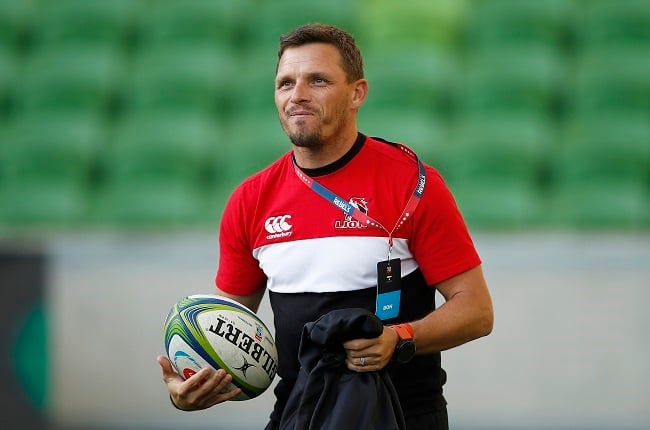


Ivan van Rooyen. (Getty Images)
- Ivan ‘Cash’ van Rooyen is the son-in-law of the late Springbok centre Darius Botha.
- His outlook on ‘resetting’ his tenure at the Lions is based on his father-in-law’s glass half-full philosophy.
- A self-confessed team man, Van Rooyen believes the Lions can apply many lessons from their relegation from Super Rugby in 2012 to forge a new period of prosperity.
When Ivan van Rooyen reflects on an immensely challenging start to his tenure as the Lions’ Super Rugby head coach, it’s notable how he adopts the proverbial glass half-full philosophy.
To a large extent that’s down to this self-confessed team man’s determination and upbringing, but also the influence of his late father-in-law.
Indeed, Van Rooyen – affectionately nicknamed “Cash” from his residence days at the University of Johannesburg – married into the equivalent of South African rugby royalty: His wife, Rienie, is the daughter of former Springbok centre Darius Botha and niece of Naas.
The 38-year-old fondly recalls numerous hearty rugby tales told by the Bothas, particularly on the infamous 1981 tour to New Zealand.
However, Darius’ impact on his son-in-law was far more acute on a spiritual level.
“It was an absolute privilege to know him,” Van Rooyen told Sport24, paying tribute to the church minister with a doctorate, whose brave battle with stomach cancer ended in 2018.
“He was a legend, a fantastic father, great grandfather and a great man. His perspective on life was unbelievable. He’s a guy who always saw the bigger picture, always positive. A lot of lives were touched by his compassion.”
Reprioritising and gaining perspective have been hallmarks of Van Rooyen’s time during lockdown.
By the time the Lions put themselves into self-isolation upon returning from New Zealand in March, the wisdom of anointing the former age-group flyhalf as Swys de Bruin’s successor was questioned.
The three-time finalists had lost five of their six Super Rugby matches and were looking increasingly chastened.
Some critics weren’t surprised.
While most other South African franchises put a premium on experience in their coaching ranks, the Ellis Park hierarchy chose to promote internally.
They saddled Van Rooyen and other inexperienced colleagues, such as Neil de Bruin, Sean Erasmus, Warren Whiteley and Julian Redelinghuys, with the responsibility of guiding a squad already in transition through choppy waters.
Results were poor, yet to question the abilities of the group is premature.
Various Lions insiders and former players will emphatically tout the knowledge of Van Rooyen and co.
The only thing they lack is experience and six matches in Super Rugby, where many far more experienced coaches also still make mistakes, can’t be considered a fair opportunity to judge them on.
Laudably, the continued faith in him and his deputies doesn’t mean Van Rooyen hasn’t taken stock of the false start to his tenure.
“Lockdown has been vital to us from a rugby perspective,” he said.
“It’s allowed us to intensively and critically review our systems. When I say we analysed our six matches deeply, I mean truly deeply.
“Perhaps the most valuable undertaking was how we consulted. We reached out to other teams and their coaches, we talked to our players because we really wanted to gain a better understanding of what we did wrong and what changes we can make. It’s been a difficult time no doubt, but it was needed.”
And you can bet top dollar that he won’t stop seeking advice and value-adding insights.
“I love being part of the strategy-making process. I’m a loyal team man and I love that environment. That’s why I’ll always subscribe to the belief that the team is bigger than any individual,” said Van Rooyen.
“When I buy into a plan, I support it all the way.”
Praised as one of South African sport’s most gifted conditioning experts, Van Rooyen might still be working on his all-round prowess as a coach, yet he’s actually very experienced in rebuilding processes.
This is, after all, the man who spearheaded the Lions becoming the fittest franchise in the country during the Johan Ackermann-inspired renaissance.
“It’s rather ironic, I believe we’re back in 2013 (when the Lions were relegated from Super Rugby),” Van Rooyen said with a chuckle.
“Corona has in a way forced us to go back to the thinking then, how we’re desperate to pick ourselves up. But the virus has also reminded us that playing rugby is a privilege, not a right.
“The pandemic has evened things out for us again. We have an opportunity to start over again and to prove a few people wrong again.”
One can hear a proud father-in-law, rather appropriately, proclaiming “Preach!” to that.

